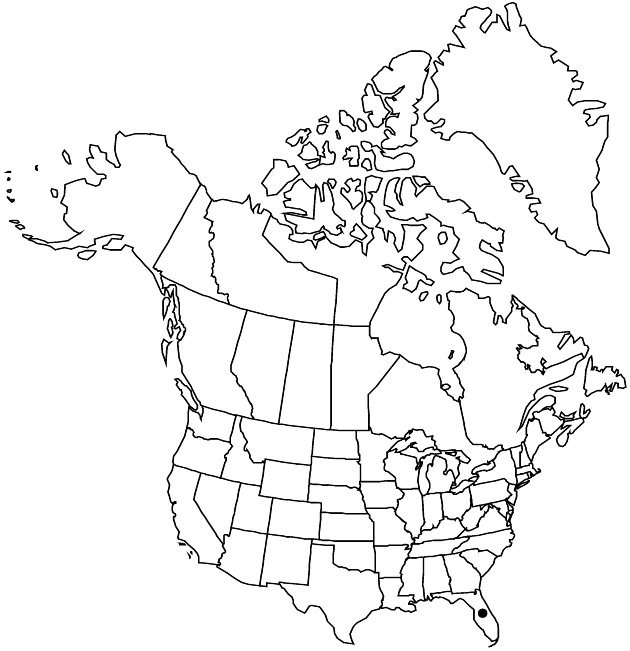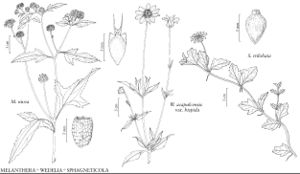Difference between revisions of "Sphagneticola trilobata"
Mem. New York Bot. Gard. 87: 114. 1996.
IntroducedIllustrated
Basionym: Silphium trilobatum Linnaeus Syst. Nat. ed. 10, 2: 1233. 1759 (as trilobatu)
Synonyms: Wedelia trilobata (Linnaeus) Hitchcock
FNA>Volume Importer |
imported>Volume Importer |
||
| Line 6: | Line 6: | ||
|place=87: 114. 1996 | |place=87: 114. 1996 | ||
|year=1996 | |year=1996 | ||
| + | }} | ||
| + | |special_status={{Treatment/ID/Special_status | ||
| + | |code=I | ||
| + | |label=Introduced | ||
| + | }}{{Treatment/ID/Special_status | ||
| + | |code=F | ||
| + | |label=Illustrated | ||
}} | }} | ||
|basionyms={{Treatment/ID/Basionym | |basionyms={{Treatment/ID/Basionym | ||
| Line 33: | Line 40: | ||
|elevation=0–10 m | |elevation=0–10 m | ||
|distribution=Fla.;Mexico;West Indies;Bermuda;Central America;South America;probably introduced in Asia;Indian Ocean Islands;Pacific Islands;Australia. | |distribution=Fla.;Mexico;West Indies;Bermuda;Central America;South America;probably introduced in Asia;Indian Ocean Islands;Pacific Islands;Australia. | ||
| + | |introduced=true | ||
|discussion=<p><i>Sphagneticola trilobata</i> is probably native to subtropics and tropics of the New World and probably introduced in Old World. It is increasingly cultivated and is to be expected as escaped or persisting in warm to hot, sandy spots anywhere in the flora area. Report of it from Louisiana has not been confirmed.</p> | |discussion=<p><i>Sphagneticola trilobata</i> is probably native to subtropics and tropics of the New World and probably introduced in Old World. It is increasingly cultivated and is to be expected as escaped or persisting in warm to hot, sandy spots anywhere in the flora area. Report of it from Louisiana has not been confirmed.</p> | ||
|tables= | |tables= | ||
| Line 56: | Line 64: | ||
|publication title=Mem. New York Bot. Gard. | |publication title=Mem. New York Bot. Gard. | ||
|publication year=1996 | |publication year=1996 | ||
| − | |special status= | + | |special status=Introduced;Illustrated |
| − | |source xml=https:// | + | |source xml=https://bibilujan@bitbucket.org/aafc-mbb/fna-data-curation.git/src/bb6b7e3a7de7d3b7888a1ad48c7fd8f5c722d8d6/coarse_grained_fna_xml/V19-20-21/V21_309.xml |
|tribe=Asteraceae tribe Heliantheae | |tribe=Asteraceae tribe Heliantheae | ||
|subtribe=Asteraceae (tribe Heliantheae) subtribe Ecliptinae | |subtribe=Asteraceae (tribe Heliantheae) subtribe Ecliptinae | ||
Revision as of 21:58, 27 May 2020
Leaf blades 5–18 × 1–5+ cm. Ray laminae 6–15 mm. Disc corollas 3.5–6 mm. Cypselae 3–5 mm. 2n = ca. 40, ca. 50–54, 50–58, 56, ca. 56, 57, and 60.
Phenology: Flowering nearly year round.
Habitat: Ruderal, wet places
Elevation: 0–10 m
Distribution

Introduced; Fla., Mexico, West Indies, Bermuda, Central America, South America, probably introduced in Asia, Indian Ocean Islands, Pacific Islands, Australia.
Discussion
Sphagneticola trilobata is probably native to subtropics and tropics of the New World and probably introduced in Old World. It is increasingly cultivated and is to be expected as escaped or persisting in warm to hot, sandy spots anywhere in the flora area. Report of it from Louisiana has not been confirmed.
Selected References
None.
Lower Taxa
None.
